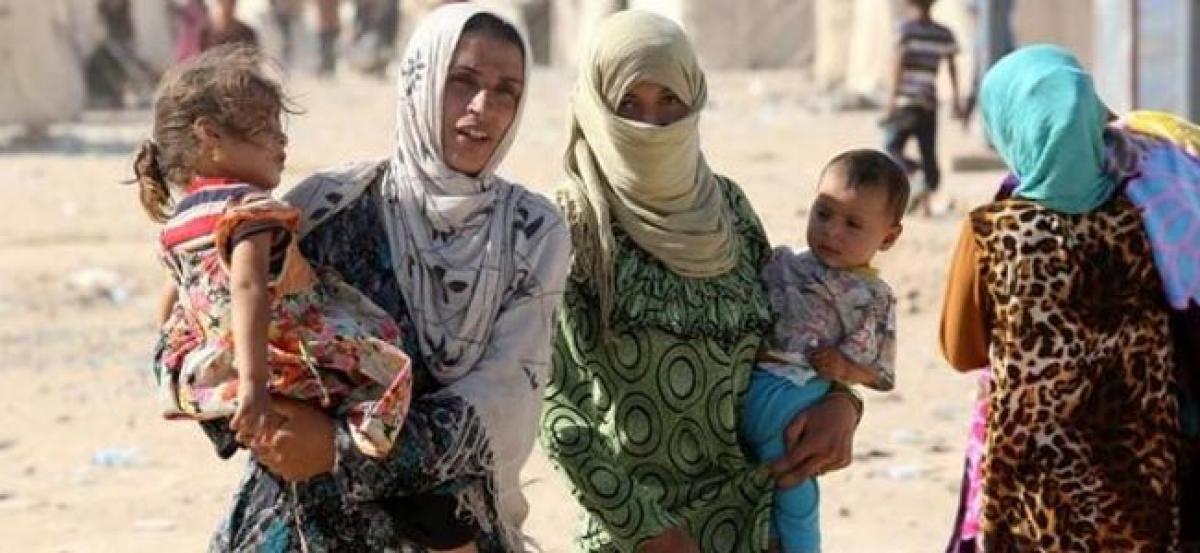Live
- Strict Protocols Set for Group 2 Exams in Wanaparthy District
- Delhi Police busts gang involved in cable theft on Delhi Metro Blue Line
- MP's Gita recitation programme finds place in Guinness World Records
- Pawan Kalyan Shines Globally as 2nd Most Googled Actor of 2024 Amid Busy Film, Political Career
- Disruptor of House is the chairman himself: Cong and INDIA bloc’s pointed remarks on No-trust notice
- IIIT-Bangalore to host computer vision conference ICVGIP 2024
- F1: Fernando Alonso ‘still dreaming’ of third world championship
- WI vs Bangladesh Watch Controversial Banter Between Shakib and King
- EFLU Celebrates Bharatiya Bhasha Diwas
- Manchu Manoj Submits Bond of Rs. 1 Lakh to Rachakonda Commissioner
Just In

Thousands are fleeing a northern Iraqi town controlled by Islamic State before a planned government assault there that would be a major step towards retaking the militant stronghold of Mosul, 100 km (60 miles) further north.
Thousands are fleeing a northern Iraqi town controlled by Islamic State before a planned government assault there that would be a major step towards retaking the militant stronghold of Mosul, 100 km (60 miles) further north.
Prime Minister Haider al-Abadi has pledged to recapture Mosul, the ultra-hardline group's de facto Iraqi capital and the largest city anywhere in its self-proclaimed caliphate, by the end of 2016, more than two years after it fell to the jihadists.
Recent gains against the militants have brought that target into focus , though critics still question whether the military is ready and what might happen to the city if Islamic State is ousted.
More than 33,000 people have fled south from Shirqat town over the past two months, according to the United Nations refugee agency UNHCR and local security officials.
Controlling Shirqat and the nearby town of Qayara is critical to protect the recently recaptured Qayara airbase from mortar and rocket attacks so that U.S.-backed Iraqi forces can use it as a logistics hub for the Mosul operation.
About 560 U.S. troops will help repair the base, which was damaged by fighting and Islamic State sabotage, to let thousands more Iraqi forces can join the main push on Mosul, which could begin by late September.
Shi'ite militia fighters on the side of the government moved to Shirqat's outskirts last week but then withdrew, militia sources said.
Iraq's elite counter-terrorism service, which has spearheaded recent battles against Islamic State, will take the lead in assaulting Shirqat, according to security sources.
Military officials declined to discuss the timing of the operation, beyond saying it would happen "soon".
In a television interview on Sunday, Defence Minister Khaled al-Obeidi would not specify whether the operation would precede the Mosul battle but said recent advances have isolated Shirqat and Hawija, further east, from the rest of Islamic State territory.
The militants, who seized a third of Iraq's territory in 2014, have been kicked out of at least half that land by army, police and Shi'ite militias over the past two years.
Government forces are also encircling Hawija, which military officials say is less strategically important for the Mosul battle.
DWINDLING RESOURCES, HARSH PUNISHMENTS
Officials have warned of a looming humanitarian disaster as locals struggle to get food and basic services.
In addition to those displaced from Shirqat, thousands of people in nearby areas are trapped between Islamic State and security forces, said a police commander in Salahuddin province, where Shirqat is located.
Civilians have been brought to a government-run camp near Hajjaj, around 80 km (50 miles) south of Shirqat, where tents have been erected in the desert with men separated from women and children for security screening.
They join more than 3.4 million people displaced across Iraq. The authorities say several hundred thousand people have returned home to areas recovered from Islamic State.
The United Nations says the main assault on Mosul could displace at least another million people, compounding pressure on a government already facing a budget deficit caused by lower oil prices.
Evacuees from Shirqat, standing in scorching summer heat last week in Hajjaj, told Reuters about inflated prices and shortages of basic supplies under Islamic State rule.
"Children died due to lack of milk," said Fayadh Dhirgham. "There was no drinking water. We had to drink water from the river and it was filthy."
Others described how the jihadists had imposed their strict interpretation of Islamic law on residents.
"You couldn't leave your house. Your dishdasha (robe) has to be short and your beard must be long," said Omar Ahmed, waiting to enter security screening. "You couldn't smoke cigarettes. For each cigarette, you would be lashed 50 times."

© 2024 Hyderabad Media House Limited/The Hans India. All rights reserved. Powered by hocalwire.com







